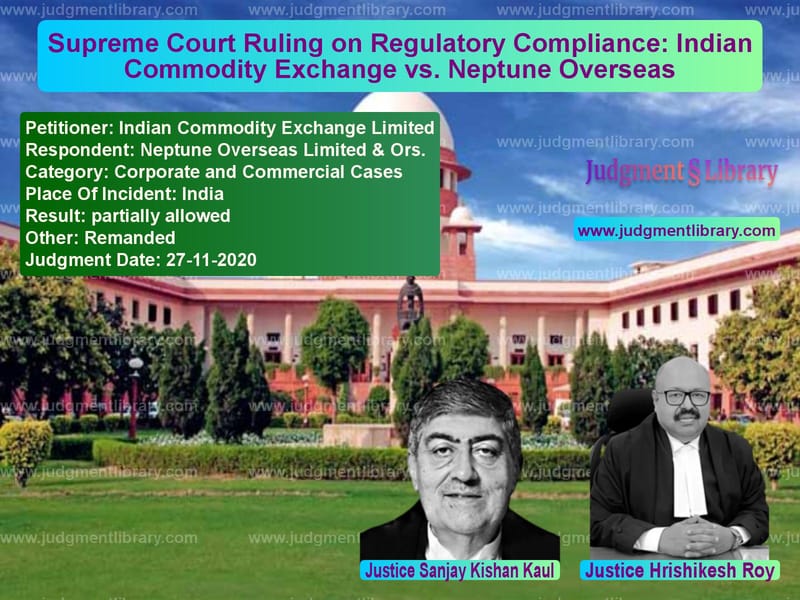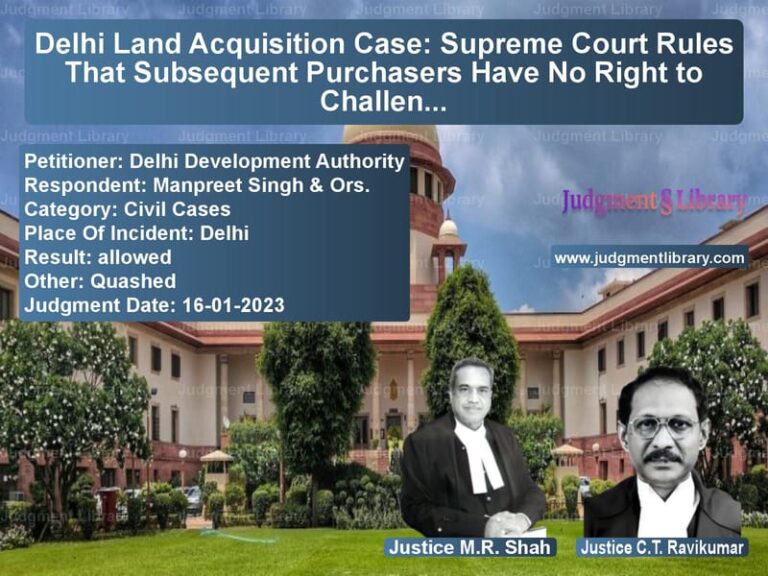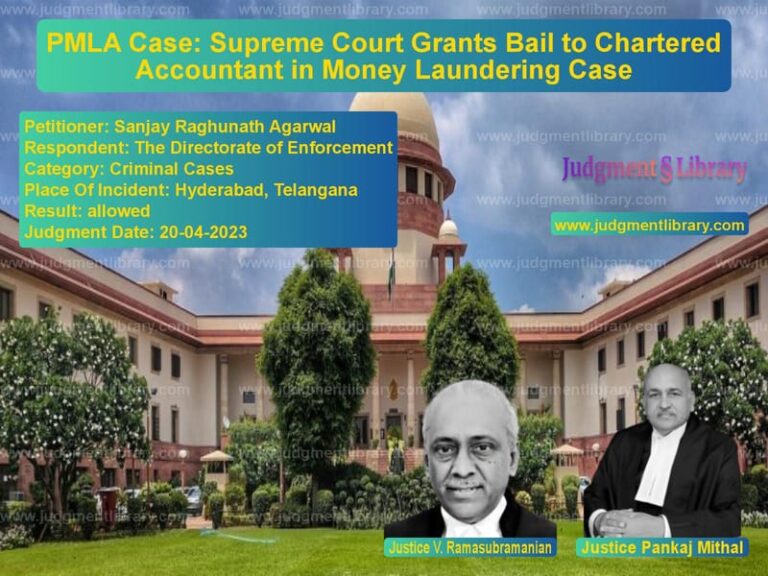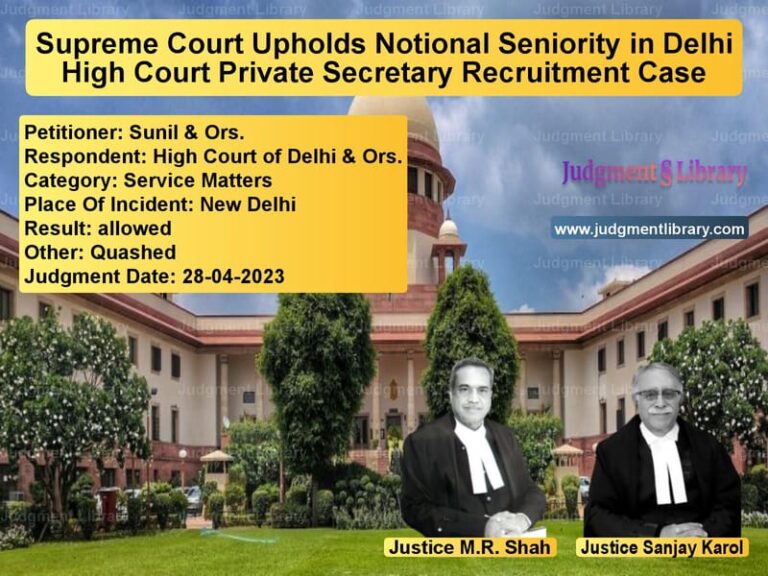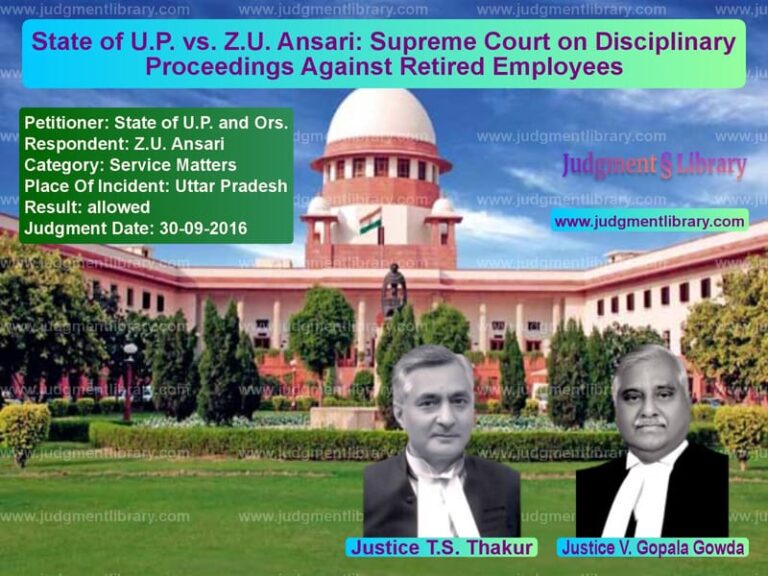Supreme Court Ruling on Regulatory Compliance: Indian Commodity Exchange vs. Neptune Overseas
The Supreme Court of India has delivered a crucial judgment in the case of Indian Commodity Exchange Limited v. Neptune Overseas Limited & Ors., which revolves around regulatory compliance, corporate governance, and fair trial principles. The case highlights the prolonged legal battle concerning trading irregularities, procedural fairness, and enforcement of financial regulations.
The judgment focuses on the procedural aspects of administrative actions, particularly in regulatory inquiries under the Forward Contracts (Regulation) Act, 1952. The Court examined whether the principles of natural justice were followed in issuing a show cause notice and whether the proceedings against the respondents complied with due process.
Background of the Case
The dispute arose from allegations of trading irregularities within the National Multi Commodity Exchange of India Limited (NMCE), which later merged with the Indian Commodity Exchange Limited (ICEL). The case involves the role of Respondent No. 1, Neptune Overseas Limited (NOL), a major shareholder in NMCE, and Respondent No. 2, Kailash Ramkishan Gupta, who held key positions in both companies.
On November 28, 2010, an independent journalist reported trading irregularities within NMCE to the Forward Markets Commission (FMC), which was then the regulatory body overseeing commodity exchanges. Following this complaint, the FMC initiated an inquiry under Section 8(2) of the Forward Contracts (Regulation) Act, 1952.
The FMC issued a detailed show cause notice on June 21, 2011, alleging serious financial misconduct by Respondent Nos. 1 and 2. However, the respondents challenged the jurisdiction of the FMC and sought adjournments. Meanwhile, the respondents also approached the Gujarat High Court, questioning the legal basis of the inquiry.
Petitioners’ (ICEL and SEBI) Arguments
The Indian Commodity Exchange Limited (ICEL) and the Securities and Exchange Board of India (SEBI), which took over the functions of FMC, contended that:
- The respondents were given ample opportunity to present their case, but they engaged in delaying tactics.
- The show cause notice was validly issued under Section 8(2) of the Forward Contracts (Regulation) Act.
- Natural justice was duly followed, as the respondents were allowed to access relevant documents.
- The respondents’ repeated adjournment requests were unjustified, and the inquiry was conducted fairly.
- The Gujarat High Court erred in setting aside the FMC’s order solely on the ground of non-service of a fresh show cause notice to NMCE.
Respondents’ (NOL and Kailash Gupta) Arguments
The respondents, Neptune Overseas Limited and Kailash Gupta, argued that:
- No proper show cause notice was issued to NMCE, violating the principles of natural justice.
- The regulatory proceedings were conducted hastily without allowing adequate time for defense.
- The FMC denied access to crucial documents, which prevented them from preparing an effective response.
- The High Court was correct in setting aside the FMC’s order due to procedural lapses.
Key Observations by the Supreme Court
1. Adherence to Natural Justice
The Supreme Court reiterated that fair administrative action must comply with the principles of natural justice. The Court observed:
“An opportunity of hearing is not a mere nicety but a valuable right. It does not fall in a straitjacket formula but must be substantial.”
The Court found that while the respondents may have sought delays, the sheer volume of documents (over 4,000 pages) warranted a reasonable time to respond.
2. Importance of a Proper Show Cause Notice
The Court noted that a valid show cause notice is the foundation of any regulatory action. It held that:
“A regulatory body cannot proceed against an entity without ensuring that the affected party has been properly notified and granted adequate time to respond.”
Although the respondents had indirect knowledge of the proceedings, the Court emphasized that due process required explicit service of notice to NMCE.
3. Corporate Veil and Regulatory Oversight
The judgment addressed the relationship between Respondent Nos. 1 and 2, suggesting that their actions were closely interlinked. The Court remarked:
“Corporate structures cannot be used to evade regulatory oversight. The principle of piercing the corporate veil applies where entities operate in bad faith.”
Despite these remarks, the Court held that procedural fairness had to be upheld, regardless of the nature of the allegations.
4. The Role of SEBI and Its Authority
Since SEBI had taken over the functions of FMC, the Court clarified that SEBI had the authority to continue the regulatory process while ensuring compliance with legal standards.
Final Verdict and Directions
The Supreme Court partially allowed the appeal and directed the following:
- No fresh show cause notice is required for Respondent No. 1.
- SEBI must provide the respondents with all requested documents.
- The respondents must file their reply within four weeks after receiving the documents.
- SEBI must conduct a fresh hearing on a day-to-day basis, without unnecessary adjournments.
- SEBI must pass a final order based on the respondents’ submissions.
- Any further challenge should be made before the Securities Appellate Tribunal (SAT).
The Court emphasized the need for expeditious proceedings, stating:
“Regulatory enforcement should not be delayed indefinitely. The respondents must now participate in the process in good faith.”
Conclusion
This ruling underscores the delicate balance between regulatory enforcement and procedural fairness. While the Court acknowledged the need for strict oversight in financial markets, it also reaffirmed the fundamental principle that no party should be penalized without due process.
The judgment serves as a precedent for regulatory bodies, ensuring that their actions align with principles of justice and transparency. It also highlights the need for corporate entities to comply with legal obligations and respond to regulatory inquiries in a timely manner.
Moving forward, the case will be a crucial reference for similar disputes involving corporate governance, financial misconduct, and procedural safeguards in regulatory proceedings.
Petitioner Name: Indian Commodity Exchange Limited.Respondent Name: Neptune Overseas Limited & Ors..Judgment By: Justice Sanjay Kishan Kaul, Justice Hrishikesh Roy.Place Of Incident: India.Judgment Date: 27-11-2020.
Don’t miss out on the full details! Download the complete judgment in PDF format below and gain valuable insights instantly!
Download Judgment: Indian Commodity Exc vs Neptune Overseas Lim Supreme Court of India Judgment Dated 27-11-2020.pdf
Direct Downlaod Judgment: Direct downlaod this Judgment
See all petitions in Corporate Governance
See all petitions in unfair trade practices
See all petitions in Company Law
See all petitions in Judgment by Sanjay Kishan Kaul
See all petitions in Judgment by Hrishikesh Roy
See all petitions in partially allowed
See all petitions in Remanded
See all petitions in supreme court of India judgments November 2020
See all petitions in 2020 judgments
See all posts in Corporate and Commercial Cases Category
See all allowed petitions in Corporate and Commercial Cases Category
See all Dismissed petitions in Corporate and Commercial Cases Category
See all partially allowed petitions in Corporate and Commercial Cases Category

